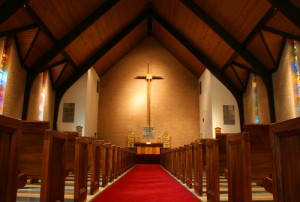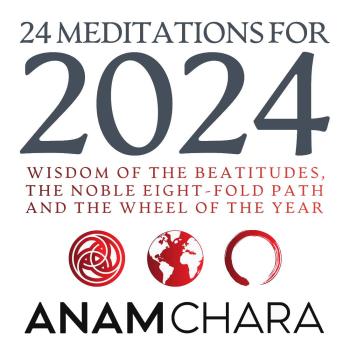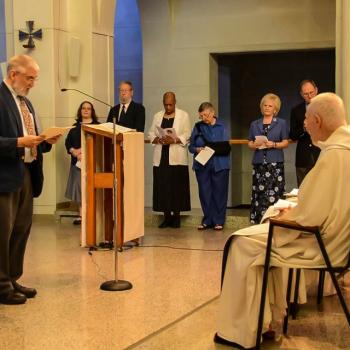 A post on this blog received the following comment yesterday:
A post on this blog received the following comment yesterday:
Having been with the Catholic Church and seminary trained for all my 71 years of life . I am naturally contemplative . But I do now believe practising formal meditation/contemplation is false . Aren’t we missing the point if we try and set time aside for contemplation?
Surely if we are made in Gods image we are already suffused with Gods holy grace and we are divinised, so if we are living in Christ what’s the point in pretending to get closer to God when He’s already there? The very air we breathe is holy .
A religionless Christianity is for me. There is now no need for a Church, priests, bible, sacraments, prayer.
My parish is the world wherever I am.
This has given me much food for thought. I promised the person who made this comment I would reply in a new blog post. So here goes. I’m writing this as a direct response to the author of the comment; hopefully it will be of interest to others as well.
Thank you for your comment. It’s wonderful that you have given your life to contemplative spirituality, to the point now where “the world is your parish” and you don’t even see a distinction between a prayer practice and living a prayerful life.
Indeed, the very air we breathe is holy!
So is the ground we walk on, the bodies we inhabit, the relationships that shape and form us every day. We are “all walking around shining like the sun,” as Merton put it. Most of us go through lives never realizing this, what a grace that you have a caught at least a glimpse of glory.
Saint Paul mandates that we “pray without ceasing” and I suspect that this means to do something similar to what Brother Lawrence calls “the practice of the presence of God” — which is to say, to reach a point of non-dual beholding where we find God in all things and all things in God.
“For the fullness of joy is to behold God in all,” as Julian of Norwich put it. Only you can say if you’ve actually reached this point, but your comment makes it sound as if you have.
I suspect that for many people, discovering the grace of “beholding God in all” includes a recognition that truly God is everywhere — not just in Church.
On a street corner in Louisville, one day Thomas Merton suddenly fell in love with everyone he saw. He realized there was greater dignity in being human than in being a monk. It was a major turning point in his life, with a rich lesson for us all.
Can We Dispense with Daily Practice (or the Church)?
When it comes to both the importance of a daily practice, or involvement in a faith community, I have a different perspective than you do.
I believe reaching the point of non-dual contemplation or “beholding God in all” renders Church and practice more necessary than ever. I’d like to share with you why I think so.
Let’s talk about daily practice first. You say:
I do now believe practising formal meditation/contemplation is false. Aren’t we missing the point if we try and set time aside for contemplation?
You give contemplative practice a label: “false.” Immediately I wonder if trying to put contemplative, or silent, prayer into words — calling it “true” or “false,” “meaningful” or “boring,” isn’t somehow missing the point.
That’s because the point of contemplative practice is silence. Not what we think or say about silence (or, for that matter, about the practice).
The point behind a contemplative practice (whether it’s liturgical prayer like the Daily Office, or a meditative exercise like centering prayer) is to dispose ourselves to silence: to a place beyond concepts like “meaningful” or “boring” or “joyful” or “false.”
We enter into intentional silence to remind ourselves to pay attention to the silence that is always, already there.
To me, the best analogy for a contemplative practice is physical exercise.
I personally don’t find a lot of joy in going to workout. I was never a jock and at age 55 I doubt if I’ll become one now! But I still try to faithfully show up at my fitness center several times a week to break a sweat.
Why? Because when I work out, I feel better the other 23 hours a day. And I know if I don’t work out, I start to lose energy, to lose muscle tone.
I believe that health is a gift from God. But if we don’t dispose ourselves to be healthy (through exercise, proper diet, enough sleep, and managing stress), then we are at risk of losing that gift.
The same goes with contemplative silence. It is a free gift from God, we can’t do anything to earn it.
In your words, “we are made in God’s image” and “we are already suffused with God’s holy grace… we are divinised.” Yes, absolutely! But are we mindful of this truth?
I believe the daily practice is essential for disposing myself to that mindfulness.
Perhaps you do not need a daily practice to maintain that level of mindfulness, of awareness, of practicing-the-presence. But I need it! For me, abandoning my daily contemplative practice would be like no longer exercising.
Maybe at first my health would stay strong. But if I stop working out, sooner or later, I’ll notice the loss.
If we are living in Christ what’s the point in pretending to get closer to God when He’s already there?
Well, yes, we are living in Christ. There’s no point in “pretending to get closer to God” — but if that’s your experience of contemplative practice, may I gently suggest that you might find it more satisfying if you think about it differently?
Contemplative practice is not about pretending anything. It’s about authenticity, about being who we truly are.
We need to let go of the internal commentary that says “this is a waste of time, this is just pretending, this is boring, you don’t need this, yada yada yada.” That’s what Buddhists call “the monkey mind.” Don’t try to argue with it, just gently let it go.
The point behind contemplative practice is to rest in silence. Whenever we think about it, or try to interpret it, we’re not doing it.
We don’t do this “to get closer to God.” That’s impossible, for already in God “we live and move and have our being” (Acts 17:28). We make a practice of resting in silence to remember — to cultivate mindfulness, to exercise the gift that has already been given.
Sure, no one needs to practice contemplative prayer. Just like no one needs to go to the fitness center. But people keep going because realize that the workout is worth the blessings that flow from it. The same principle is at work in contemplative practice.
The Church and the Contemplative
The final words of your comment:
A religionless Christianity is for me. There is now no need for a Church, priests, bible, sacraments, prayer.
My parish is the world wherever I am.
To push my metaphor further: if contemplative practice is like a workout, then the Church is like the fitness center.
Some people can stay physically fit without membership in a fitness center. But that requires tremendous willpower, commitment, and resolve. For most of us mere mortals, joining (and using) a fitness center is essential for staying physically fit.
I think the same can be said of Church participation and “spiritual fitness.”

Now, I do believe that a small percentage of Christians are called to the vocation of hermit. If that is you, then of course I wish you well and much grace as you live into the calling you have received.
But even hermits need other people, just like a pilot needs a ground crew: the mechanic, the air traffic controller, the meteorologist, and so forth.
I think it’s important to remember that “Church” is just a fancy word for “community.” To say “I have no need for Church” is tantamount to saying “I have no need for other people.”
Now, I know that many people have had terrible experiences with their local church. People have been abused, exploited, oppressed by individuals and by the institution as a whole. The Church is made up of sinners, after all.
But when something is broken, you fix it. Human beings need community. If our communities are broken, the solution is to build better communities, not to give up on community altogether.
So I’m afraid I must disagree when you say “there is no need” for the Church, etc. That’s like saying “I’m physically fit. I no longer need the gym, or a trainer, or weights, or the treadmill.”
If you’re that good, then why don’t you help out some folks who aren’t as far along as you?
Which brings me to, what I suppose, is the main point of this long post. Maybe after years of contemplative living, you’ve decided you no longer need the Church (I disagree with you, but you’re entitled to your opinion).
But doesn’t the Church need you?
Again and again I get emails from Christians who struggle because their hearts have opened up to contemplative spirituality, and yet their Churches aren’t there yet. I feel their pain, because I’ve been there too.
I hear from clergy persons — priests and ministers — who feel this way. I also hear from laypeople in the same boat.
I believe the Christian Church (not just Catholicism, but all the denominations) is in the midst of a spiritual revolution, as the Holy Spirit calls more and more people to embrace contemplative prayer and practice.
But we’re at the cutting edge, friends. Many Christians still haven’t received the memo.
The Church needs contemplatives. The Church needs us to be contemplatives in the Church — even if all the other members of the Church don’t realize it yet.
I’m not saying we all need to go and start centering prayer groups, or teach a class on mysticism, or whatever. In many places, the last thing that is needed is another “program.”
In some places, though, that might be important. We all need to discern where we are called.
But I think in many Churches, we simply need to be present. We need to share with the clergy and other Church leaders that we are called to pray in silence. And then we need to do it. We need to be a contemplative presence in the Church.
Sometimes this might mean starting a program, or teaching a class. Or it might mean a ministry of spiritual companionship. Or it could just mean a daily ministry of intercessory silent prayer.
Every contemplative will have a unique calling. But I believe with all my heart that a central part of following Christ is washing one another’s feet.
And the Church is where we do that.
A Final Word
To my friend who left the comment: I do not mean to preach to you, and I have no interest in saying you are right or wrong. I trust you to follow God as best you can.
But I hope you can at least see, in this post, that there are some positive things to say about maintaining a committed daily prayer practice, and about being part of a faith community.
Commitment and community. They’re beautiful. Certainly not perfect. But necessary anyway.
Do you have a question about silent prayer, contemplative living, or Christian mysticism? If so, please leave it in a comment below — and I might choose it to feature in a future blog post. Thanks for reading!
Enjoy reading this blog?
Click here to become a patron.














